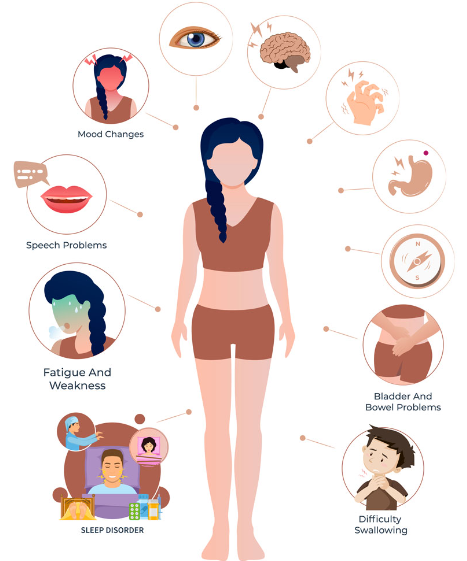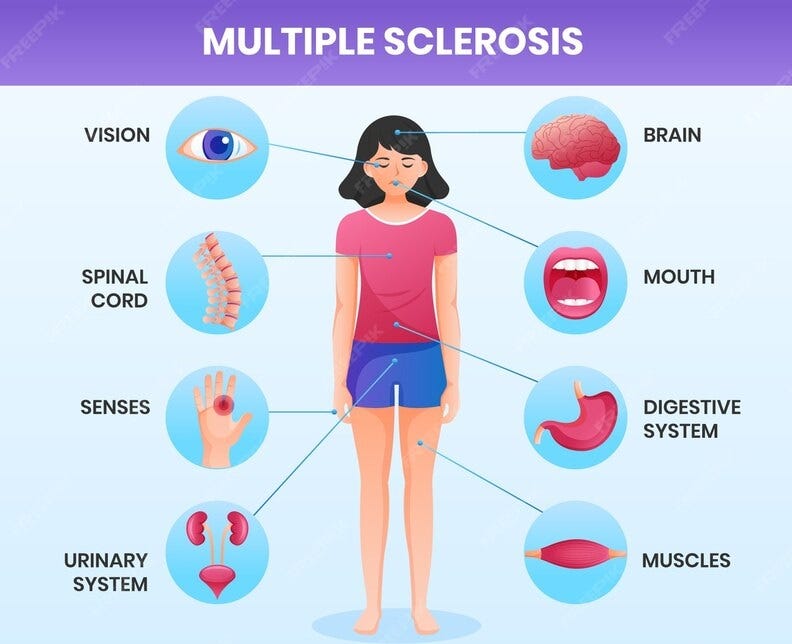
Holistic Healing for Multiple Sclerosis: Diet & Ayurvedic Treatment Strategies
February 10, 2024Hope for Tremors: Exploring Ayurvedic Management of Parkinson’s Disease
February 25, 2024Multiple Sclerosis (MS) is an autoimmune disease that affects the central nervous system. It disrupts the normal flow of communication between the brain, spinal cord, and other parts of the body. There is no cure for MS, but treatment can help manage symptoms and improve quality of life. This blog post explores the potential benefits of integrating traditional Ayurvedic practices alongside modern medical approaches for managing MS.

Understanding Multiple Sclerosis
MS symptoms can vary depending on the affected areas of the nervous system. Common symptoms include:
- Fatigue
- Muscle weakness
- Numbness or tingling
- Vision problems
- Balance problems
- Bladder or bowel problems
- Cognitive difficulties
The exact cause of MS is unknown, but it’s believed to be a combination of genetic and environmental factors. There are different types of MS, each with its own progression pattern.
Modern Medical Approach to MS
Conventional treatment for MS focuses on managing symptoms and preventing relapses. Medications like disease-modifying therapies (DMTs) can help slow disease progression. Other medications address specific symptoms like fatigue, pain, and spasticity. Rehabilitation therapies like physical therapy, occupational therapy, and speech therapy can help patients maintain function and independence.
Ayurveda for MS: A Holistic Approach
Ayurveda, the traditional Indian system of medicine, offers a holistic approach to health and well-being. It emphasizes maintaining a balance between the mind, body, and spirit. Ayurvedic practitioners believe that MS can be caused by an imbalance in the doshas, which are the three biological energies that govern our body’s functions. These doshas are Vata (air and space), Pitta (fire and water), and Kapha (earth and water).

Potential Benefits of Ayurveda for MS
While there is limited scientific evidence to definitively prove the efficacy of Ayurveda for MS, some studies suggest potential benefits. Here’s how Ayurveda might support individuals with MS:
- Panchakarma: This detoxification process can help eliminate ama, or toxins, that are believed to contribute to imbalances in the body.
- Herbal Remedies: Certain Ayurvedic herbs like Ashwagandha, Shankhapushpi, and Bala can have immunomodulatory and neuroprotective effects, potentially reducing inflammation and supporting nerve function.
- Dietary Therapy: Following an Ayurvedic diet that is specific to your doshic constitution can promote gut health, reduce inflammation, and improve overall well-being.
- Yoga and Meditation: These practices can help manage stress, improve sleep, and enhance emotional well-being, all of which can be impacted by MS.
Integrating Ayurveda with Modern Medicine
It’s important to remember that Ayurveda is not a replacement for conventional medical treatment for MS. However, it can be a valuable complementary therapy to improve overall health and well-being. Here are some key points to consider for integration:
- Always consult your doctor before starting any Ayurvedic treatment, especially if you are taking medications.
- Find a qualified Ayurvedic practitioner who is experienced in working with MS patients.
- Be transparent about your medical history and current medications with your Ayurvedic practitioner.
- Start slowly and gradually introduce Ayurvedic practices into your routine.
ShreeVidya Herbal Research Center’s Approach
ShreeVidya Herbal Research Center’s website or contact information) emphasizes a patient-centered approach that combines the wisdom of Ayurveda with the advancements of modern medicine. They can work with you to develop a personalized treatment plan that addresses your specific needs and health goals.
Living with MS: A Journey of Hope
Multiple Sclerosis can be a challenging condition, but there is hope. By integrating modern medical approaches with complementary therapies like Ayurveda, you can take charge of your health and manage your symptoms effectively. Remember, a healthy lifestyle that includes a balanced diet, regular exercise, stress management techniques, and good sleep hygiene is crucial for anyone living with MS.
Disclaimer
The information provided in this blog post is for educational purposes only and should not be taken as medical advice. Always consult with your doctor before starting any new treatment program, including Ayurvedic therapies.


